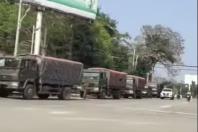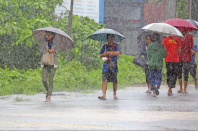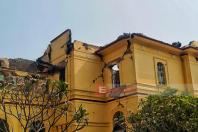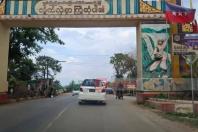The Island/ANN - The current national health emergency has crippled every business but the narcotic trade, which continues to thrive. There have been several successful drug-busting operations, in different parts of the country, since the imposition of lockdowns and curfews, the latest being the detection of 225 kilos of heroin on 14 May. This alone is proof that the supply of narcotics has not dwindled in spite of restrictions on transport and the heavy military and police presence on roads.
The ongoing anti-narcotic raids are commendable, and those who conduct them, risking their lives, deserve praise, but much more needs to be done to break the back of the drug trade.
The police believe the drug runners responsible for the abortive bid to transport the haul of heroin seized, last week, are working for an underworld figure, known as Kosgoda Tharaka, who is currently in jail. A senior prison officer is under probe for assisting Tharaka in running his drug trade from his cell, as we reported on 15 May. Convicts cannot carry out underworld operations from their cells without any help from their guards. Several prison officers have faced probes over the years for their links to wealthy drug dealers in jail, but nothing has come of those investigations.
Successful drug-busting ops that the Police Narcotics Bureau conducts after months of planning fail to cripple the supply of narcotics because the drug barons, arrested, prosecuted and sentenced, enjoy freedom to operate from behind bars. Strangely, no serious attempt has been made to prevent these elements from running their drug business via mobile phones.
One may recall that towards the tail end of his tenure, President Maithripala Sirisena caused quite a stir by vowing to have drug kingpins on death row hanged for running narcotic operations. He drew heavy flak from human rights groups, for trying to resume judicial executions. Nobody was sent to the gallows.
Sirisena, true to form, got the wrong end of the stick and made a lot of noise. He also turned his anti-drug campaign into a political circus. Instead of stirring up a hornet’s nest, he should have had the corrupt prison officers aiding and abetting convicted drug dealers arrested and prosecuted.
The detection of clusters of Covid-19 infections would not have been possible, here, but for the deployment of military and police intelligence personnel to trace them. This method could be employed to catch the prison officers in the pay of drug barons as well. After all, for those who take pride in having decimated the LTTE’s military muscle, ridding the country’s prisons of drug barons’ confederates in the garb of prison officers should be child’s play.
Prisons are separate territories where the writ of the state does not run, to all intents and purposes, if the freedom convicted drug barons enjoy is anything to go by. It is time they were liberated from the clutches of corrupt officers who have sold their souls to criminals.
One of the most effective ways of preventing communication between drug barons in jail and their gangs is to ban mobile phones in prisons. A pilot project was launched, a few years ago, to install cell phone jammers in prisons, but it withered on the vine. One of the excuses the prison authorities trotted out for abandoning the project was that the jammers affected the communication systems in the residential areas around jails. The government should seriously consider reviving this project and transfer drug lords serving sentences to prisons such as the one in Angunukolapelessa so that jammers will not be a problem for the public.
If some of the corrupt prison officers working for the drug Mafia are caught and jailed while regular inspections are conducted in prisons to seize banned items, that will have a deterrent effect on others of their ilk.










